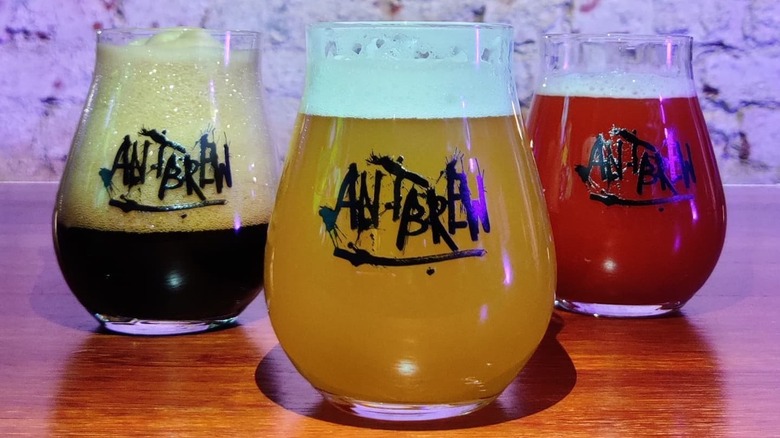Finland's Buzziest Sustainable Beer Is Brewed With Goose Poop
Yes, you did read that title correctly, and no, it's not nearly as gross as it sounds. Ant Brew, a brewery in Lahti, Finland, is making a beer with the aid of goose poop, and it's all in the name of the environment.
The food and beverage industry is one of the biggest contributors to climate change, responsible for roughly a quarter of global greenhouse gas emissions, according to the Meridian Institute. If we have any hope of pulling our planet out of this mess, we need to make drastic changes to the things we eat and drink, which is why sustainable food is one of the most important issues of our time.
You may already be familiar with some of the methods used to make environmentally-friendly meals. The Union of Concerned Scientists highlights crop rotation, agroforestry, and eliminating the use of chemical pesticides as key methods by which we can create more sustainable food systems. But some folks are getting a bit more creative in their approach to sustainability. Labs are experimenting with in vitro meat to replace cattle, fish farms are turning to algae for vegetarian feed, and many have promoted edible insects as the protein of the future (per Smithsonian). Ant Brew is thinking even further outside the box.
Ant Brew's Wasted Potential series honors its hometown
In 2021, Ant Brew released a line of sustainable beers named "Wasted Potential." Per Food & Wine, the series was made in collaboration with the brewery's hometown of Lahti, Finland, which was named the European Green Capital of 2021 by the European Commission.
This honor was based on numerous factors, particularly Lahti's efforts to improve air quality and reduce carbon emissions. The city has implemented strong air quality regulations and made great strides in reducing pollution from automobiles. It has also set an ambitious goal to become completely carbon neutral by the year 2025, which is 25 years ahead of the European Union's overall objective.
One issue that's particularly annoying to the people of Lahti is the large amount of poop left in city parks by the local geese population, which is where Ant Brew's beer, cheekily named "Goosebumps," comes into play. According to the Nordic Labour Journal, the brewery collects goose droppings from parks and uses them to smoke the malt for its beer. Malt is an essential ingredient of beer, providing the sugars used for fermentation (per U.C. Davis). Smoking malt is done to dry it out and impart flavor, traditionally done with wood such as oak or peat, per Bison Brew. Ant Brew's Goosebumps simply swaps the wood for goose droppings that have been dried and sanitized by boiling. (The Nordic Labour Journal assures that none of the poop actually goes in the beer.)
Goose poop isn't the only unexpected element in Ant Brew beer
Even though it doesn't go into the brew itself, using goose poop at any point in the beer making process is a surefire way to attract attention on top of pursuing sustainability. Sure enough, Goosebumps has earned Ant Brew a great deal of publicity, so much so that it overshadows the other beers in the growing Wasted Potential series. According to the Nordic Labour Journal, there are now more than 10 beers in the lineup, all of which embody one or more tenants of sustainable food culture, from utilizing local produce to recycling food that would otherwise go to waste.
Other highlights of the Wasted Potential line include "Herbal Hipster," a beer flavored with locally-grown herbs. There's also "Wild Bunch," which again uses local produce, but this time, it's weeds being used rather than conventional herbs. The most eyebrow-raising name among the selection has to be "Dumpster Diver," which uses the discarded peels from a local juicery to imbue the beer with hints of citrus.
The newest addition to Ant Brew's catalog is "Find that Fish," an ale made with the dried swim bladders of roach fish. Per Green Lahti, these aren't good to eat but need to be selectively removed from the local Lake Vesijärvi to prevent eutrophication. Swim bladders, like goose poop, sound undeniably unappetizing, but this kind of creative thinking is necessary for the future of the food and beverage industry.


